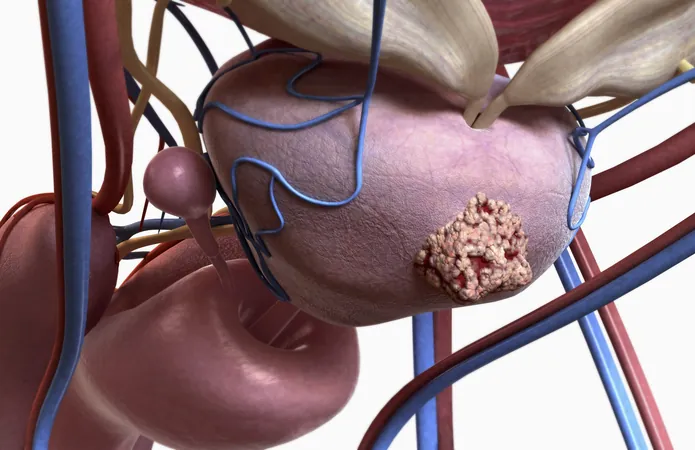
Discovering the Deadly Link: WNT9B Gene Significantly Elevates Prostate Cancer Risk!
2025-01-29
Author: Wei Ling
Groundbreaking Study Reveals Genetic Connection to Prostate Cancer
A groundbreaking study conducted by researchers at Vanderbilt University reveals that variants of the WNT9B gene, if inherited, can substantially elevate the risk of developing prostate cancer. This connection has raised alarm bells in the medical community, as extracted data from four prominent biobanks across Europe shows that men carrying the variant are at a shocking two to twelve times higher risk of diagnosis.
Prostate Cancer Prevalence and Genetic Insights
Prostate cancer is alarmingly prevalent, ranking as the second most commonly diagnosed cancer among men, only surpassed by skin cancer. Each year, approximately 1.2 million new cases emerge, with an estimated 25% believed to have genetic roots. With such staggering statistics, understanding the genetic factors behind this disease is more crucial than ever.
Research Significance and Challenges
Jeffrey Smith, the lead author of the study and an associate professor at Vanderbilt, emphasized the need for more awareness: "Unlike breast cancer, relatively few high-risk prostate cancer genes have been identified thus far. The inherited risk for prostate cancer is about twice that of breast cancer, yet its complexity presents significant challenges for global research."
WNT9B and Other Genetic Factors
While genes such as BRCA2 and HOXB13 have been recognized as high-risk factors for prostate cancer, the discovery of WNT9B adds to the arsenal of genetic determinants. Variants in WNT9B, particularly E152K, have demonstrated a substantial 2.5-fold increase in risk according to an extensive meta-analysis encompassing approximately 500,000 individuals. Another concerning variant, Q47R, attained genome-wide significance within the Finnish population.
Additional Genetic Links
The study also noted less significant ties between two additional genes, KMT2D and DHCR7, and prostate cancer, indicating the intricate genetic landscape involved in this disease. The authors underscore how WNT9B aligns with both HOXB13 and HNF1B, as all three genes are critical for the development of the prostate during embryonic stages.
Importance of Genetic Awareness and Screening
Understanding one's genetic predisposition to cancer is vital. The identification of mutations provides opportunities for early screening and tailored treatments, which can significantly improve patient outcomes. Smith further asserts, "The risk for prostate cancer posed by pathogenic WNT9B mutations is comparable to the risk of breast cancer associated with mutations commonly tested in breast cancer care."
Future Research Directions
As researchers move forward, they aim to investigate whether WNT9B mutations could sway clinical outcomes for affected patients. Specifically, they will explore the potential of employing precision therapies tailored to these high-risk individuals, seeking to unlock new avenues for treatment and prevention.
Conclusion and Call to Action
Stay tuned for the latest developments in this urgent area of research, as the implications of these findings could reshape the future landscape of prostate cancer diagnosis and treatment for countless men around the globe!




 Brasil (PT)
Brasil (PT)
 Canada (EN)
Canada (EN)
 Chile (ES)
Chile (ES)
 Česko (CS)
Česko (CS)
 대한민국 (KO)
대한민국 (KO)
 España (ES)
España (ES)
 France (FR)
France (FR)
 Hong Kong (EN)
Hong Kong (EN)
 Italia (IT)
Italia (IT)
 日本 (JA)
日本 (JA)
 Magyarország (HU)
Magyarország (HU)
 Norge (NO)
Norge (NO)
 Polska (PL)
Polska (PL)
 Schweiz (DE)
Schweiz (DE)
 Singapore (EN)
Singapore (EN)
 Sverige (SV)
Sverige (SV)
 Suomi (FI)
Suomi (FI)
 Türkiye (TR)
Türkiye (TR)